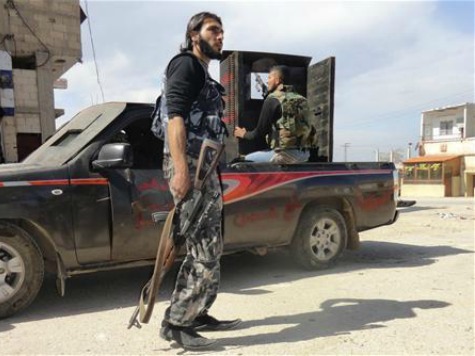The Islamic State has gained momentum in both Syria and Iraq while allegedly “moderate” groups against President Bashar al-Assad in the former nation have suffered increasing setbacks. With the outlook dire, even the U.S. State Department is admitting that a military overthrow of Assad appears far from a viable reality.
Speaking to the House Foreign Affairs Committee, senior State Department official Brett McGurk said the State Department “do not see a situation in which the rebels are able to remove [Assad] from power,” instead noting that Assad’s removal would have to be a “democratic” process.
The admission raises questions regarding President Obama’s continued push to arm and support “moderate” rebels against Assad, citing the use of chemical weapons against civilians, among other human rights violations. The President initially allowed for weapons to reach Syrian rebels who were considered “moderate” in June 2013, in response to allegations and accrued evidence that Assad had used chemical weapons against civilians. At the time, a poll found that 70% of Americans opposed the President’s action.
A year later, Assad appeared nowhere closer to falling, yet the President once again called arming moderate rebels– this time engaging Congress. The President and Congress finally agreed to a $500 million program to train and arm rebels vetted to be moderate.
At the moment, the program is not expected to begin until March, according to Foreign Policy. It aims to train 5,000 rebels per year, but many have criticized it as a slow reaction to a crisis that is bleeding millions of refugees into the outside world a day, not counting those displaced within Syria. A particularly troubling report this week from McClatchy indicates that there is currently little to no support to rebels on the ground from the United States at all– many rebel leaders say they have received nothing– leaving unanswered questions as to where the funding has been going.
Meanwhile, both Assad and the Islamic State have been making gains, as well as the Syrian jihadist group the Al Nusra Front. Al-Nusra, which is affiliated with Al Qaeda, alleged this week that they had used a United Nations vehicle in a terrorist attack in Syria, a milestone for the group’s fight against the West. In Jordan and Afghanistan, the Islamic State’s popularity is only growing, posing the serious danger of a new influx of foreign jihadis into the Syrian war theater.
President Assad remains in power, with increasing confidence. In a recent interview with Paris Match magazine, Assad went so far as to blame the United States for the creation of ISIS, and call airstrikes against ISIS targets within Syria by US and coalition forces “illegal,” despite the consensus that they have helped his army. Of his own rule, Assad remained confident that “we as Syrians will never accept that Syria become a western puppet state”– which is to say, accept his removal from power as long as the United States has a role to play.
The situation leaves reasonable doubt regarding the potential for rebel groups to remove Assad, making McGurk’s comments an almost necessary reality from the State Department. Nonetheless, such comments do not appear to be currently interfering with President Obama’s plans to spend $500 million on training and arming rebels that even his State Department see little potential for victory in.

COMMENTS
Please let us know if you're having issues with commenting.